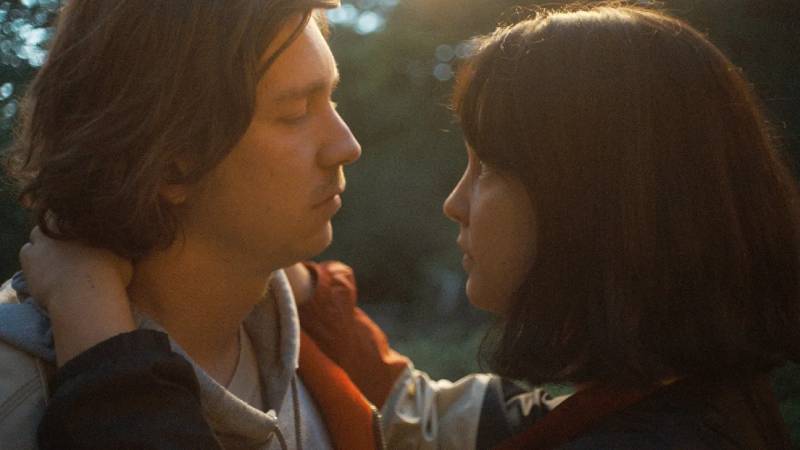




Aactor-turned-director Brittany Snow, tackles the heavy issues of eating disorders and mental health in her thoughtful feature debut, Parachute (2023).
The New York City set story takes place over seven years, and begins with Riley (Courtney Eaton), sitting outside an eating disorder clinic. Her best friend Casey (Francesca Reale) picks her up and persuades her to go out that night to a karaoke bar, where she meets stranger, Ethan (Thomas Mann). The attraction is immediate, but Riley explains that she shouldn’t enter into a relationship during her first twelve months of recovery. An awkward encounter back at her apartment temporarily extinguishes their lust. However, unable to deny the attraction for long, they decide against a romantic relationship only after sleeping together.
Snow and co-writer Becca Gleason play on our perception that two things are exclusive, or that romance is a deeper bond than friendship. They create the illusion that the platonic offers a boundary to co-dependency. We’re happy Riley finds a connection, but it quickly becomes apparent that this beautiful friendship, in the context of her circumstances, is a perilous one.
Parachute is set up as Riley’s story, but Snow and Gleason expand the focus to include Ethan, who becomes the film’s supporting subject. They refrain from psychoanalysing their characters any more than is necessary, but from the glimpse we’re given into their private lives, it’s unsurprising they are drawn to one another.
Ethan’s alcoholic father, who he drives home from bars, seems the significant nurturing figure. It might, however, be his tolerant mother. Riley is an extension of these two relationships, that sees him drawn to someone who needs help, jeopardising his own wellbeing.
Nor is it surprising given Riley is someone who struggles with self-compassion, and seeks validation from others. In contrast, however, Riley’s mother is absent. A later scene suggests that her mum might have a portion of blame – the daughter’s struggles to know how to love herself are mirrored in a mother uncertain how to love her daughter, compensating instead with financial support Neither of these characters can be so neatly critiqued. Snow and Gleason invite us to consider their protagonists. It’s not particularly audacious, instead it’s thoughtful and assured filmmaking.
We don’t recall the film in its totality, instead, it resembles a series of polaroid images. Like in life, bad memories are easier to remember, but there are pleasant scenes, such as Riley and Ethan’s trips to the hardware store. It becomes a metaphor for Riley needing to take charge of her life, to manage her disorder and to trust herself. The filmmakers take these lighter scenes and transform them into something, if not profound, then meaningful – a collection of scenes that become a microcosm of the film itself.

Parachute is a reminder that someone can appear to be okay, even if they’re not. A person like Riley experiences life as a perpetual rollercoaster of emotions, and there’s an authenticity about what moments of despair and self-loathing look and feel like. For those in the audience that have experienced such emotions, these scenes will provoke uncomfortable feelings, with Riley becoming their warped reflection.
To their credit, Snow and Gleason do not dramatise, patronise or diminish the raw emotions of these moments. They attempt to treat them with dignity, nor do they excuse Riley. There’s a reason why she acts the way she does, and maybe she’s still only capable of hurting others. This is not an attempt to offer excuses, only reasons, and the filmmakers are sympathetic to both Riley and those who are affected by her suffering. As her therapist tells her, there’s no good or bad food, like she’s neither a good nor bad person. This nuance is brought to bear in a film that asks its audience to move beyond simple determinants.
Snow uses the cinematography and editing to communicate Riley’s internal thoughts and point-of-view, specifically the impulsive self-criticism she can’t escape. The camera is always respectful of her dignity, and even in her most vulnerable moments, it’s never exploitative. Yet it draws attention to the toxic nature of comparing ourselves to others, and our own self-critical gaze. The film subtly infers how social media is a means for connection, but also an enabler for the negative behavioural patterns of vulnerable persons. Parachute doesn’t condemn social media, instead it tries to explore how someone like Riley needs to manage stimuli, and to create a balance between an introverted and extraverted lifestyle.
The directing, writing and performances suggest Parachute comes from personal understanding, or intimate research. Either way, it’s an impressive first feature, and Snow and her collaborators should be commended for digging down into its subject. If there is a flaw, it’s the limitations of the narrative structure to tidy up messy life experiences, but that aside, this is an empathetic and thoughtful film.
Parachute premieres at the 31st Raindance Film Festival.
Don’t forget to read our exclusive interview with actor-turned-director Brittany Snow!
















